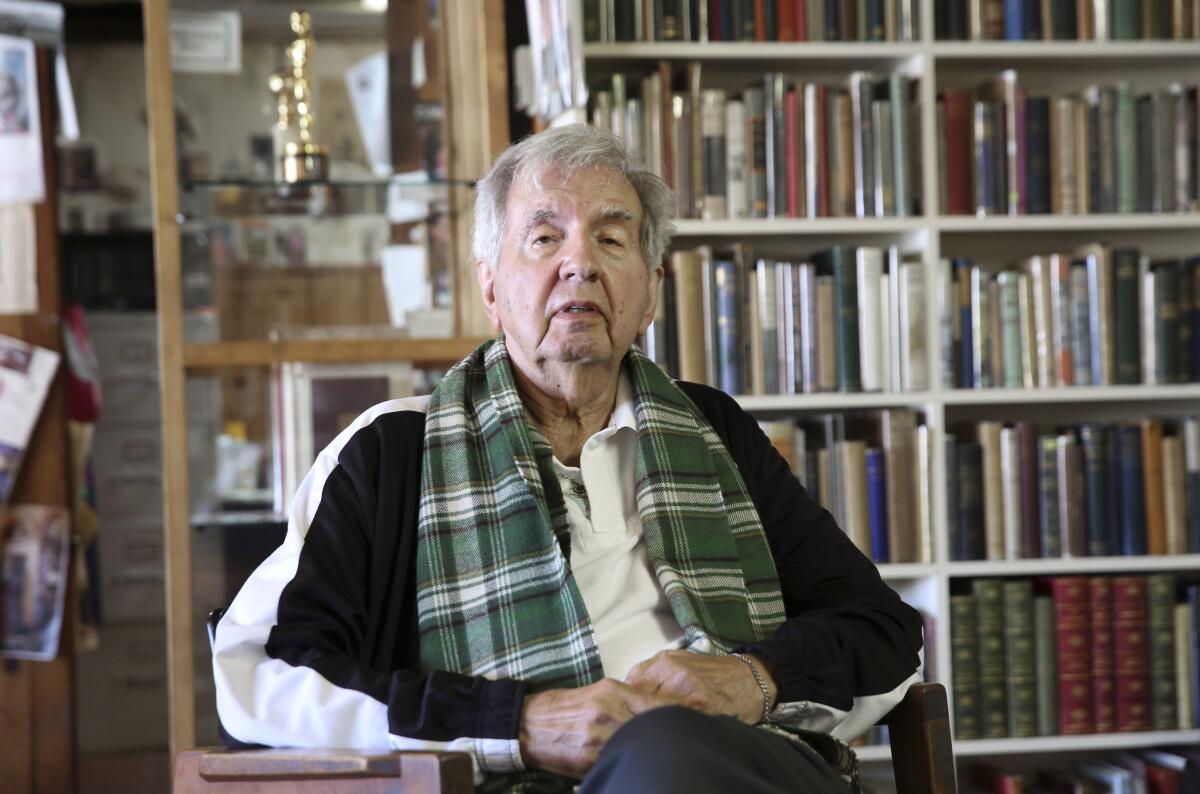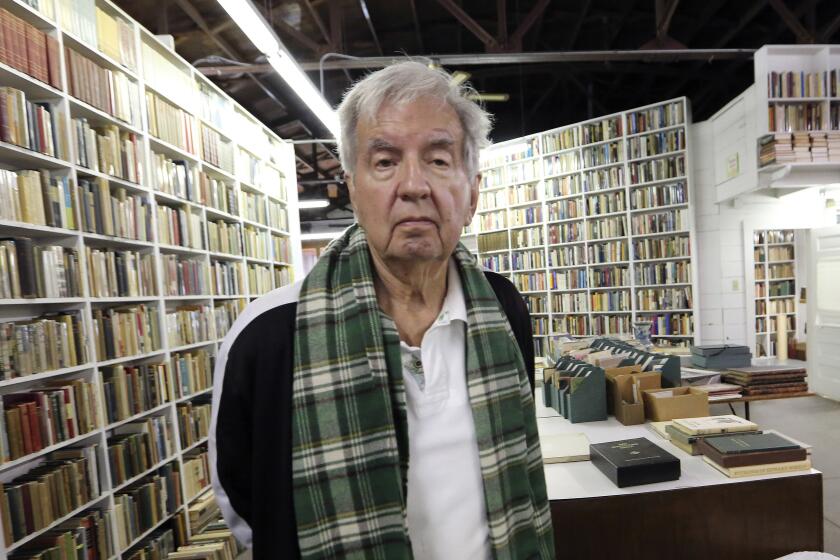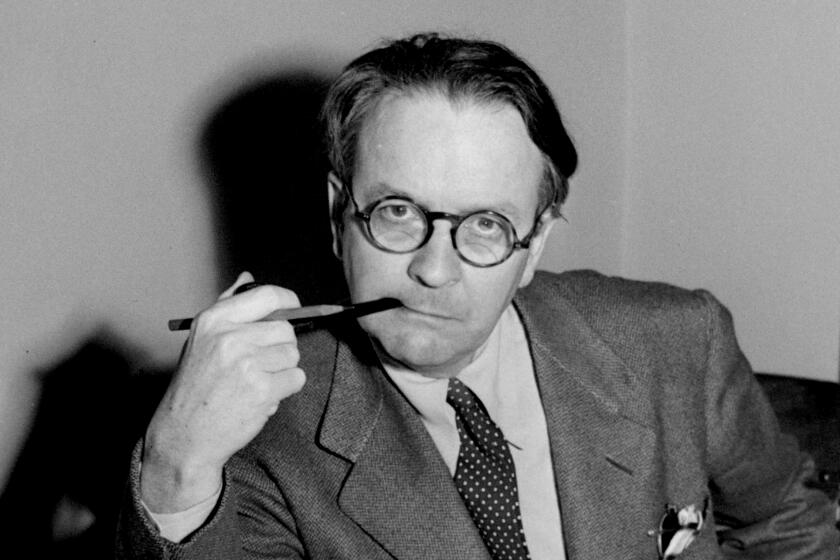Appreciation: How Larry McMurtry’s early work obliterated western clichés

- Share via
When I think of Larry McMurtry — who died on Thursday at 84 — I recall a photograph taken in the late 1960s or early 1970s: a portrait of the artist as a young man. In it, he plays with a cat while wearing a sweatshirt emblazoned with the slogan “Minor Regional Novelist.” Such an image almost perfectly reflects what made McMurtry such a feisty talent, self-deprecating and pointed by turns.
On the one hand, it reads like a joke he’s playing on himself. On the other, it is a provocation, a challenge to the literary status quo. McMurtry, after all, was nothing if not a regionalist; he lived for much of his life in Archer City, the small north Texas town where he was born. In a number of his books, most famously the 1966 novel “The Last Picture Show,” he recast Archer City as Thalia, a community caught between the present and the past.
What he understood — the real point of the joke — was that every writer is a regionalist, that literature has no center except for the human heart. Like so many of his characters, he relished standing on the outside, looking in.
What I admired most about McMurtry was his ambition, which was almost Faulknerian, or so it seemed from the broad strokes of his fictional universe. This was true not only of his early Thalia novels (“Horseman, Pass By,” “Leaving Cheyenne” and “The Last Picture Show”), but also of the three linked works that followed — “Moving On,” “All My Friends Are Going to Be Strangers” and “Terms of Endearment”— which mapped in 1960s Houston a narrative terrain not unlike Yoknapatawpha County, with characters who kept crossing paths from book to book.
When I first encountered these works, as a high school student in the 1970s, it was this that moved me, the way he made his literature out of ordinary elements. From the magnificent Patsy Carpenter, whose desire for fulfillment propels her out of the emptiness of her marriage, to her best friend Emma Horton, whose death of cancer closes “Terms of Endearment,” McMurtry traces complex lives with an unsentimental matter-of-factness.
“It was inconsiderate, she thought, how blandly people mentioned the future in the sick rooms,” he wrote of Emma. “Phrases like next summer were always popping out; people made such assumptions about their own continuity.”
Larry McMurtry, the author known for outspoken, brassy characters of the old West who also won a 2006 Oscar for ‘Brokeback Mountain,’ has died at 84.
Perhaps the best — or, at any rate, my favorite — of McMurtry’s early writings is “In a Narrow Grave: Essays on Texas,” published in 1968. We might consider it a hinge project, suspended between the first three Thalia novels and the subsequent three Houston books.
“I started, indeed, to call this book ‘The Cowboy in the Suburb,’” he wrote, “but chose the present title because I wanted a tone that was elegiac rather than sociological. Nonetheless, I think it is essentially that movement, from country to subdivision, homeplace to metropolis, that gives life in present-day Texas its passion.” Coming as it does in the collection’s introduction, the statement resonates like a shot across the bow.
What McMurtry was arguing was what he also illustrated in those first six novels — that Texas literature, not unlike the state itself, needed to push beyond its clichés. These included the myth of the western, as embodied by such mawkish writers as J. Frank Dobie; “I suppose I am as fond of responsible genres as the next man,” McMurtry grumbled in reaction, “but I am by no means sure I want the Western to become one.”
It’s a bold statement, a cultural repositioning, and it revealed the depth of his intentions to reinvigorate the literature of the place. The irony, of course, is that McMurtry would end up as responsible as anyone for framing the western as a “responsible genre” with the publication of “Lonesome Dove,” the saga of a 19th century cattle drive; it won the Pulitzer Prize for fiction in 1986.
I am a “Lonesome Dove” apostate. It’s enjoyable enough to read — all of McMurtry’s books are — but I can’t help considering it a retrenchment, the work of a writer no longer sure of himself or his own audacity, falling back on the old familiar forms. There’s some evidence that McMurtry also felt this way: “I thought I had written about a harsh time and some pretty harsh people,” he acknowledged in the preface to a 2000 reprint of the novel, “but, to the public at large, I had produced something nearer to an idealization; instead of a poor man’s ‘Inferno,’ filled with violence, faithlessness and betrayal, I had actually delivered a kind of ‘Gone With the Wind’ of the West, a turnabout I’ll be mulling over for a long, long time.”
The great Larry McMurtry, who died Thursday, is lauded by authors, screenwriters: “I was entertained by him, which was ALL important,” Stephen King said.
In its wake, McMurtry seemed to lose his way, producing other westerns and an array of sequels to his older work. These books are slapdash, hasty, devoid of urgency. “I’ve written enough fiction,” he told the Texas Monthly in 1997. Yet he went on to produce 10 more novels and a variety of nonfiction titles. He also wrote, in collaboration with Diana Ossana, the screenplay for “Brokeback Mountain,” which won the Academy Award for adapted screenplay in 2006.
McMurtry was a longtime antiquarian bookseller; his store, Booked Up, in Archer City — a place he’d previously described as “a bookless town” — once had 400,000 volumes spread among six locations, although he auctioned off the bulk of them in 2012. He understood, in every way that matters, what words are worth.
In the final pages of “All My Friends Are Going to Be Strangers,” the narrator, a minor regional novelist named Danny Deck, drowns a manuscript in the Rio Grande. “I had never felt such black, unforgiving hatred of anything,” he insists, “as I felt for the pages in my hands.”
What he’s saying is that love and longing go together, that the things that matter can cause pain. Such a double vision motivates McMurtry’s finest writing, which remains a necessary excavation of the complicated bond between identity and place.
Ulin is the former book editor and book critic of The Times.
More to Read
Sign up for our Book Club newsletter
Get the latest news, events and more from the Los Angeles Times Book Club, and help us get L.A. reading and talking.
You may occasionally receive promotional content from the Los Angeles Times.










